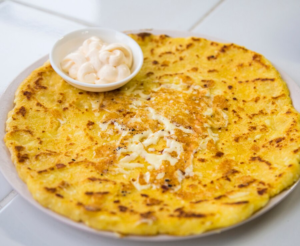Introduction:
In the vast tapestry of Indian cuisine, one dish stands out for its versatility, flavor, and sheer deliciousness—the humble paratha. Join us on a journey through the crispy, flaky layers of this culinary masterpiece, exploring its history, regional variations, and why it deserves a prime spot on your plate.
A Flaky History:
The roots of paratha can be traced back centuries to the Indian subcontinent. Originally a North Indian dish, the word “paratha” is derived from the amalgamation of two words—parat and atta, meaning layers of cooked dough. Traditionally, parathas were a hearty breakfast for Punjabi farmers, providing them with the energy needed for a day of hard work in the fields.
Crafting the Perfect Paratha:
The art of making parathas lies in the dough. A combination of whole wheat flour, water, and a pinch of salt is kneaded to create a soft, pliable dough. This dough is then rolled into small balls, flattened, and folded into layers. The result is a delectable unleavened flatbread with crispy, golden-brown layers.
Versatility on Your Plate:
What makes paratha truly exceptional is its ability to transform into a myriad of flavors. Here are some popular variations that showcase the diversity of this Indian delight:
- Aloo Paratha: Stuffed with spiced mashed potatoes, aloo paratha is a North Indian classic. The interplay of the soft potato filling and the crispy layers of the paratha is nothing short of heavenly.
- Gobi Paratha: For a delightful vegetarian option, gobi paratha, stuffed with spiced cauliflower, is a favorite. The earthy flavor of cauliflower perfectly complements the flaky texture of the paratha.
- Paneer Paratha: Bursting with the goodness of Indian cottage cheese, paneer paratha is a protein-packed delight. The crumbly texture of paneer combined with the layers of the paratha creates a satisfying meal.
- Keema Paratha: A carnivore’s dream, keema paratha is filled with spiced minced meat. The rich flavors of the meat meld seamlessly with the crispy layers, making it a favorite across India.
Regional Delights:
Just like the diverse culture of India, paratha comes in various regional avatars. In Punjab, it’s served with a dollop of butter and yogurt. In Gujarat, it may be paired with a sweet mango chutney. In Delhi, the streets are lined with vendors flipping parathas on giant tawas, ready to be devoured with a side of tangy pickles.
Paratha and Health:
While parathas are a carb-lover’s delight, they can be part of a balanced diet. The whole wheat flour provides fiber, and the versatility allows for healthy stuffing options. Pair it with yogurt, pickles, or a fresh salad, and you have a meal that satisfies both your taste buds and your nutritional needs.
In Conclusion:
Paratha is more than just a dish; it’s a cultural icon, a comfort food, and a canvas for culinary creativity. Whether enjoyed on a bustling Delhi street or prepared with love in your own kitchen, the paratha invites you to experience the rich tapestry of Indian flavors, one crispy layer at a time.
So, the next time you savor a perfectly cooked paratha, remember that you’re biting into centuries of tradition and a recipe crafted with love and care.
